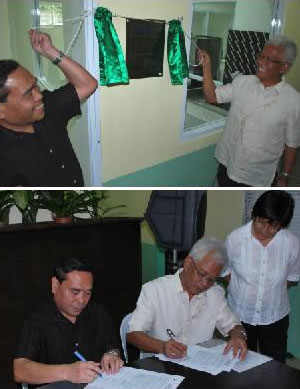
Philippines Upgrades GMO and Pathogen Detection Laboratory
December 18, 2009| |
 The Philippine Department of Agriculture (DA) Bureau of Plant Industry Plant Quarantine Service (BPI-PQS) upgraded its molecular testing facility for plant pathogen and GMO detection in order to enhance efficiency and effectivity of lab analyses that comply with international standards. The improvement of the facility and procurement of necessary equipment were provided through a grant from the DA-Biotechnology Program Unit and the assistance of the International Service for the Acquisition of Agri-Biotech Applications (ISAAA).
The Philippine Department of Agriculture (DA) Bureau of Plant Industry Plant Quarantine Service (BPI-PQS) upgraded its molecular testing facility for plant pathogen and GMO detection in order to enhance efficiency and effectivity of lab analyses that comply with international standards. The improvement of the facility and procurement of necessary equipment were provided through a grant from the DA-Biotechnology Program Unit and the assistance of the International Service for the Acquisition of Agri-Biotech Applications (ISAAA).
The upgraded facility was donated by DA and ISAAA to the BPI during the turn-over ceremony last December 15. "The Philippines' biotech regulation continues to evolve and learn from its experiences since the first approval of GM product in 2002. We need to set-up necessary infrastructure for the testing and detection of GMOs and plant pathogen in order to continuously perform our tasks as the main regulatory agency for biotechnology in the country," said BPI Assistant Director Clarito Barron during the turn-over ceremony. To date, the Bureau has now approved 51 events for the direct use and importation of several biotech crops such as alfalfa, corn, soybean and potato.
The enhancement of the molecular laboratory of BPI-PQS will further boost the confidence of the general public on the capability of BPI in implementing DA Administrative Order No.8, the policy that governs the importation and release into the environment of plants and plant products derived from the use of modern biotechnology. With increased capability, the molecular laboratory can carry out testing of agricultural products that may contain GMOs not approved by the regulation, and monitor the entry of exotic pests. The facility also opens service opportunities in testing samples sent by neighboring countries for GMO and pathogen detection.
For additional information on biotechnology updates in the Philippines, email bic@agri.searca.org or visit www.bic.searca.org
| |
Biotech Updates is a weekly newsletter of ISAAA, a not-for-profit organization. It is distributed for free to over 22,000 subscribers worldwide to inform them about the key developments in biosciences, especially in biotechnology. Your support will help us in our mission to feed the world with knowledge. You can help by donating as little as $10.
-
See more articles:
-
News from Around the World
- Agriculture and Forestry Groups Release Joint Statement of Negotiators at Copenhagen
- Efforts to Reduce Hunger Still Slow, Says IFPRI Report
- Africa Needs to Reduce Agricultural Barriers, Says Report
- Agricultural Technocrats Call for Nationwide Biotech Awareness
- Francophone West Africa Biotech Report
- Brazil Clears New Herbicide-Tolerant GM Soybean
- CIP Publishes Online Database for Potato and Sweetpotato
- Brazilian Farmers Plant More GM than Conventional Crops
- USDA Seeks Comment on Environmental Impact Statement for GM Alfalfa
- Rasi Seeds Launches 'HyVeg' Brand Vegetable Seed in India
- Drought Tolerance Gene Granted Chinese Patent
- Vietnamese Policy Makers Endorse Biotechnology
- Philippines Upgrades GMO and Pathogen Detection Laboratory
- Syngenta Signs Pact to Develop Sugarcanes with Increased Sugar Content
- BASF Signs Plant Biotech Agreement with South Korean Company, University
- Turkey Lifts Import Ban on GMOs
- Ukraine Officially Accepts the First Application for State Registration of GMO
- Report on Bee Mortality and Bee Surveillance in Europe
- Bulgaria Parliament to Ease Laws on GM Crop Cultivation
- EFSA Releases Scientific Opinion on Monsanto's GM Oilseed Rape
-
Research Highlights
- Newly Discovered Enzymes could be Targeted to Make Water-Wise Crops
- Antagonistic Genes Control Rice Growth
-
Announcements
- Plant Breeding for Drought Tolerance
- 97th Indian Science Congress
- Practical Course on 'Genomic Approaches to Evolution and Development'
- Call for Biopharming Platforms and R&D Proposals in South Africa
-
Read the latest: - Biotech Updates (December 3, 2025)
- Gene Editing Supplement (November 26, 2025)
- Gene Drive Supplement (February 22, 2023)
-
Subscribe to BU: - Share
- Tweet
